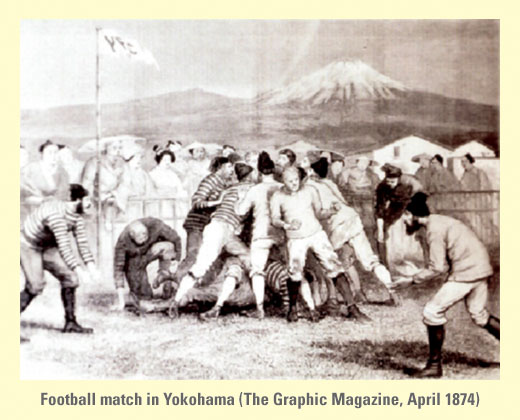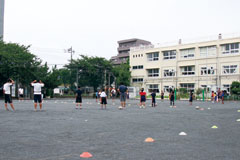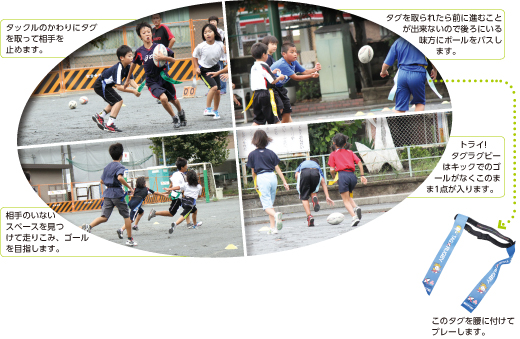SPORTS YOKOHAMA Vol.27:Feature01


Do you know that Yokohama was the place where rugby was first introduced to Japan?
After the opening of its port in 1859, Yokohama was in an unstable situation with antiforeigner movements and government overthrow schemes under way. In the aftermath of the Namamugi Incident of September 1862 (which occurred near a place now known as Namamugi, Tsurumi Ward, Yokohama City), the British government dispatched its 20th squadron to Yokohama in January 1864 in order to restore order and protect its citizens living there. History has it that it was the rugby-loving soldiers of this 20th squadron who first played the sport in the British troop camp located in what is now the Yamate District of Naka Ward. And, in 1866, the Yokohama Football Club (YFBC) was founded. According to the Graphic Magazine published in April 1874, the first rugby match in Asia was played in 1873 between an English team and a Scotch/Irish team.
Edward Bramwell Clarke, born in Yokohama in 1874, graduated from Cambridge University and came back home in 1899 to teach at Keio University, where he taught rugby to students as a way of enhancing mental and physical health. In 1901, the first rugby match by Japanese took place between the YC&AC (now the Yokohama Country and Athletic Club) and Keio University in Yokohama Park (located near the present Yokohama Stadium).
Today, a vast range of Yokohama residents, from elementary school pupils to elderly people, enjoy rugby. Also, it has been decided that the Rugby World Cup will be held in Japan in 2019. We hope you will have an opportunity to get to know the sport and feel its appeal firsthand.
The above is based on an excerpt from the book “Yokohama Rugby Story” by Tsutomu Nagai, Executive Director of the Kanagawa Rugby Football Union, which was created by translating and compiling the book “Uncovering the roots of rugby in its Asian birthplace – Yokohama” by Mike Galbraith, former captain of the YC&AC rugby club.
Information and photos provided by: Japan Rugby Football Union, Kanagawa Rugby Football Union, Yokohama Rugby Football Union, Toyooka Elementary School Tag Rugby Club, NPO Yokohama Rugby Academy, Kanagawa Tamariba Club, Kanto Gakuin University Rugby Club, Nippon Sport Science University Rugby Club, and Toin Gakuen High School Rugby Club
Researched and written and photos provided by: Keiji Nakamura (Yokohama Sport Association)


Toyooka Elementary School in Tsurumi Ward, which I visited for this article, introduced tag rugby into its physical education class, and soon after, children and parents voluntarily started to gather at school and practice tag rugby together every Saturday.
Rugby is often associated with aggressive tackles or hard-to-learn rules, which makes people shy away from the sport. Tag rugby involves no physical contact, as in a tackle in rugby football, and employs simple rules. It can be played by anyone – child or adult, man or woman, inexperienced or experienced. Yokohama City introduced tag rugby into elementary school curriculum ahead of most other municipalities and holds competitions on a regular basis. The Ministry of Education incorporated tag rugby into its new curriculum guidelines in 2011. Tag rugby combines the fun of chasing and the teamwork of passing, as in soccer and basketball, without the tackles and other contact elements, making it a sport that anyone can enjoy playing safely. I saw children running around passionately in the school yard in chase of the ball, and their faces were beaming with vitality.

A player stops the ball carrier by taking off one of the tags that he or she is wearing.
A player scores a try. One try is worth one point, and there is no goal kicking.
The ball carrier runs through an open field for a goal.
Once the ball carrier has his or her tag removed, he or she cannot move forward and therefore passes the ball to another member of the team.
A player wears this belt, which has two tags attached to it, around his or her waist.
The 25th Kanagawa Tag Rugby Tournament will be held on January 21, 2012, with the participation of elementary school pupils in Kanagawa Prefecture. Prior to this tournament, Yokohama City will host a qualifying event at the Nagisa Ground in Marine Park on December 11. Everyone is encouraged to take part in the event with friends and family members.
Kanagawa Rugby Football Union http://www.rugby-kanagawa.jp/tag/


Do you know that Yokohama was the place where rugby was first introduced to Japan?
After the opening of its port in 1859, Yokohama was in an unstable situation with antiforeigner movements and government overthrow schemes under way. In the aftermath of the Namamugi Incident of September 1862 (which occurred near a place now known as Namamugi, Tsurumi Ward, Yokohama City), the British government dispatched its 20th squadron to Yokohama in January 1864 in order to restore order and protect its citizens living there. History has it that it was the rugby-loving soldiers of this 20th squadron who first played the sport in the British troop camp located in what is now the Yamate District of Naka Ward. And, in 1866, the Yokohama Football Club (YFBC) was founded. According to the Graphic Magazine published in April 1874, the first rugby match in Asia was played in 1873 between an English team and a Scotch/Irish team.
Edward Bramwell Clarke, born in Yokohama in 1874, graduated from Cambridge University and came back home in 1899 to teach at Keio University, where he taught rugby to students as a way of enhancing mental and physical health. In 1901, the first rugby match by Japanese took place between the YC&AC (now the Yokohama Country and Athletic Club) and Keio University in Yokohama Park (located near the present Yokohama Stadium).
Today, a vast range of Yokohama residents, from elementary school pupils to elderly people, enjoy rugby. Also, it has been decided that the Rugby World Cup will be held in Japan in 2019. We hope you will have an opportunity to get to know the sport and feel its appeal firsthand.
The above is based on an excerpt from the book “Yokohama Rugby Story” by Tsutomu Nagai, Executive Director of the Kanagawa Rugby Football Union, which was created by translating and compiling the book “Uncovering the roots of rugby in its Asian birthplace – Yokohama” by Mike Galbraith, former captain of the YC&AC rugby club.
Information and photos provided by: Japan Rugby Football Union, Kanagawa Rugby Football Union, Yokohama Rugby Football Union, Toyooka Elementary School Tag Rugby Club, NPO Yokohama Rugby Academy, Kanagawa Tamariba Club, Kanto Gakuin University Rugby Club, Nippon Sport Science University Rugby Club, and Toin Gakuen High School Rugby Club
Researched and written and photos provided by: Keiji Nakamura (Yokohama Sport Association)


Toyooka Elementary School in Tsurumi Ward, which I visited for this article, introduced tag rugby into its physical education class, and soon after, children and parents voluntarily started to gather at school and practice tag rugby together every Saturday.
Rugby is often associated with aggressive tackles or hard-to-learn rules, which makes people shy away from the sport. Tag rugby involves no physical contact, as in a tackle in rugby football, and employs simple rules. It can be played by anyone – child or adult, man or woman, inexperienced or experienced. Yokohama City introduced tag rugby into elementary school curriculum ahead of most other municipalities and holds competitions on a regular basis. The Ministry of Education incorporated tag rugby into its new curriculum guidelines in 2011. Tag rugby combines the fun of chasing and the teamwork of passing, as in soccer and basketball, without the tackles and other contact elements, making it a sport that anyone can enjoy playing safely. I saw children running around passionately in the school yard in chase of the ball, and their faces were beaming with vitality.

A player stops the ball carrier by taking off one of the tags that he or she is wearing.
A player scores a try. One try is worth one point, and there is no goal kicking.
The ball carrier runs through an open field for a goal.
Once the ball carrier has his or her tag removed, he or she cannot move forward and therefore passes the ball to another member of the team.
A player wears this belt, which has two tags attached to it, around his or her waist.
The 25th Kanagawa Tag Rugby Tournament will be held on January 21, 2012, with the participation of elementary school pupils in Kanagawa Prefecture. Prior to this tournament, Yokohama City will host a qualifying event at the Nagisa Ground in Marine Park on December 11. Everyone is encouraged to take part in the event with friends and family members.
Kanagawa Rugby Football Union http://www.rugby-kanagawa.jp/tag/
 ハマスポ
ハマスポ
 お知らせ&トピックス
お知らせ&トピックス ページトップへ戻る
ページトップへ戻る ページトップへ戻る
ページトップへ戻る

